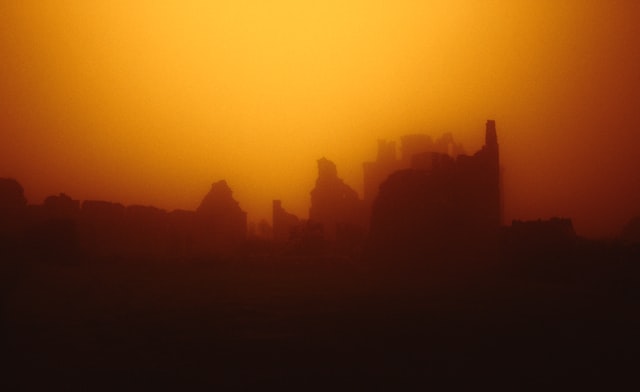by Nicole Yurcaba

In the skies above, a drone soars, snapping pictures, documenting humanity and landscape. Somewhere thousands of miles from where the operator sits, a different drone fires missiles onto the unsuspecting, its operator separated from the first-hand carnage. Below the drone’s territory, social media and cell phones fuel poor decisions: irrevocable texts and photographs sent and sexted spell disastrous consequences for the parties involved. Via experimental forms and discreet language, Corey Van Landingham presents the fragmentation of humanity and experience in a collection where the past’s hurt and destruction informs today’s war mechanisms and modern human fallibilities.
The memorable poem “Desiderata” invokes the memorable 1920s Max Ehrmann prose poem in both form and tone. Whereas Ehrmann’s poem provided explicit pieces of advice for pursuing happiness, Van Landingham’s poem is more insular, depicting the somewhat violent relationship between the speaker and another person. Readers see the speaker with their cheek “pushed…against the aqueduct until it bled.” The speaker exhibits a form of Stockholm Syndrome as they confess amidst the violence “Someday we won’t fall so apart, or need / our blood.” Fueling the relationship’s confusion are the prose form, the lengthened lines relying on stream-of-consciousness that push the poem and the reader forward, into the acknowledgement “They say Rome wasn’t built in a day, but wasn’t one day it fallen?”
A silent form of violence is at the core of Van Landingham’s collection, but the poem “In Which I Misread the Title as Devotional Paleontology” provides a quiet moment of respite from the personal and universal depictions of harm humans inflict on one another. Humorous and quirky, the poem displays human fallibility at its most innocent—a misreading of a single word that reshapes the speaker’s original thoughts and intentions. Relying on images of trilobites and “their death curl” as well as “primitive sharks, continents of forests,” the poem invites readers to return to the beginning, a place where the speaker questions their intent and purpose: “Adopting their armor, couldn’t I abandon the ocean, grow legs and walk / into the arms of a beautiful irreversible extinction?” The poem acts as a call for self-exploration, and it encourages readers to acknowledge what they know and what they don’t: “There’s hope in the study of things. / That a lost world might stay a little longer.” Ultimately, readers find a peaceful plea—for change, for enlightenment, for progress.
Nonetheless, in Van Landingham’s collection, peace literally and figuratively does not last. The governmental abuse of technological advancements that result in weaponry that makes war even more inhumane permeates poems like “On the Theory of Descent” and “Love Letter to MQ-1C Gray Eagle.” “On the Theory of Descent” returns to the evolutionary premise exhibited in “In Which I Misread the Title as Devotional Paleontology.” The word “war” appears only twice in the poem. In the first instance, the speaker states “And from the war / of nature comes the production / of a higher animal,” implying that Darwin’s theories rely on a combative nature in order to ensure a species’ survival. In the second, the speaker poses, “Say / from the war of nature comes / what we need— / a machine more than man.” This second statement implies that because of humankind’s manipulation, Darwin’s theories have progressed into something maniacal and unnatural, inherently violent. A question arises, breaking the speaker’s philosophical meditations: “What mind wouldn’t / want this?” This evolution separates “Clean tactic, poor boys / of America” and keeps them “safe before a screen.” The war power provided by the advanced weaponry creates a form colonialism as “Operators, in their padded / chairs, in low, tan Midwestern / buildings, cannot hear / the buzzing—like a thousand chainsaws.” This sense of colonialism is reinforced by images of the drones dominating skies “Over Gaza” and the way Van Landingham uses Pashtu language in juxtaposition to English: “Bangana—Pashtu for wasp—sing us a song we can fall down into.” At the poem’s conclusion, the speaker uses a statement, rather than a question, that relies on the word “god-like,” as they reflect “Who wouldn’t feel / god-like, so hover, so composed,” again implying colonialism.
“Love Letter to MQ-1C Gray Eagle” utilizes a different approach—a direct address: “Drone, you have seen me pick a fig straight from the tree.” The personification strips away the metallic mechanics of the killer’s technology. The drone becomes an intimate object, almost voyeuristic: “This is how lovers / consume things, in the moment, making the flies jealous.” The speaker implies that the relationship between humanity and the drones that surveil and destroy large aspects of existence is irreversible, even though those below the drone rarely see it, and the speaker’s address relies on the word “Maybe:” “Or maybe their being / birthed. Maybe you see this too, my wherever-you-are, my keeper.” The address progresses into an even deeper one, one that possesses a devotional tone, which then waxes spiritual in subsequent lines: “Because of you, when my arms are upraised to the sky, / they are also appraised.” The line echoes the word “god-like” from “On the Theory of Descent.” The poem concludes with the speaker again invoking affectionate diminutives: “My metalcraft, my no-see-um, my I-dare-you-to-come-down from there.” Even more powerfully, the conclusion relies on an ethical question: “—if you require no hands and I require no / privacy, aren’t we destined to be less human together in the dark?”
A Love Letter to Who Owns the Heavens requires multiple, informed readings. With its focus on the juxtaposition of human existence and war, the collection bears a striking similarity to Yusef Komunyakaa’s Dien Cai Dau. Its depictions of the isolation technology imposes on those who use it and are ultimately the victims of it bears a haunting relevancy, and its message about how humanity chooses to evolve itself for its betterment or its worsening serves as a stark warning. If anything, Van Landigham’s writing asks readers to look inside themselves as well as in the skies above them.
Nicole Yurcaba (Ukrainian: Нікола Юрцаба–Nikola Yurtsaba) is a Ukrainian (Hutsul/Lemko) American poet and essayist. Her poems and essays have appeared in The Atlanta Review, The Lindenwood Review, Whiskey Island, Raven Chronicles, West Trade Review, Appalachian Heritage, North of Oxford, and many other online and print journals. Nicole teaches poetry workshops for Southern New Hampshire University and is a guest book reviewer for Sage Cigarettes, Tupelo Quarterly, Colorado Review, and The Southern Review of Books.



Add your first comment to this post